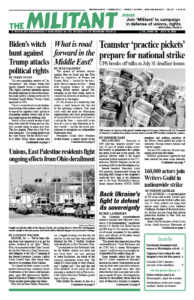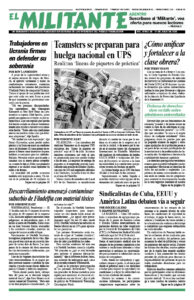LONDON — In a bipartisan assault on political rights, a parliamentary committee moved to suspend former Conservative Prime Minister Boris Johnson from Parliament before he resigned June 9. The move threatens freedoms that are needed and used by working people.
Some members of Parliament’s Privileges Committee, including its chair, Labour’s Harriet Harman, had openly declared Johnson guilty before working up evidence to remove him. The committee’s majority is from Johnson’s own party.
Johnson was targeted for his political course both as prime minister and subsequently. He decided to quit and not fight the attempt to drive him out. There will now be a by-election July 20 in the Uxbridge and South Ruislip constituency where he was elected to Parliament in 2019. He will not be a candidate.
“I’m no Johnson supporter,” telecommunications engineer Saqib Faizi told this worker-correspondent at his doorstep in the constituency. “But I think it’s up to the people who vote to decide whether he’s an MP, not a parliamentary committee.”
Johnson resigned after the Privileges Committee found him guilty of misleading Members of Parliament when he was prime minister over his attendance at parties that didn’t comply with pandemic lockdown regulations. The committee also found Johnson guilty of “being complicit in a campaign of abuse and attempted intimidation of the committee.” The “evidence” for this was Johnson calling the committee a “kangaroo court” that was carrying out a “witch hunt.” This legislative body said it would have suspended Johnson from Parliament for 90 days had he not quit.
It also recommended he be stripped of a pass to enter Parliament that is usually issued to former MPs, barring him from automatic entry into the building.
In their drive to oust him, Johnson’s opponents took advantage of the fact that millions of working people were angered that Johnson refused to abide by the same kind of harsh lockdown restrictions imposed by his government that prevented them from having contact with one another. This included the separation from loved ones at death’s door in hospitals or attending funerals.
It was the third move against Johnson since fellow Conservatives forced him out as prime minister. He was fined by the police and then condemned in a report by a senior civil servant, Susan Gray. A campaign targeted Johnson for his alleged “immoral” character. The Privileges Committee report was adopted by Parliament, with six Conservatives voting against, while 225 MPs, more than a third of the body, stayed away on the day of the vote, or abstained.
As a result of the committee’s decisions “no MP is free from vendetta, or expulsion on trumped-up charges by a tiny minority,” Johnson said.
Cop operation targets SNP leaders
In a separate probe two days later, Nicola Sturgeon, the former Scottish First Minister and Scottish National Party leader, was arrested. She was held for questioning for seven hours June 11. The operation was part of a two-year-long state probe into the Scottish National Party.
Sturgeon’s political opponents accuse SNP officers of misusing money raised by the party for a future referendum campaign on Scottish independence. As part of the cop operation, Sturgeon’s husband, Peter Murrell, who was the party’s former chief executive officer, and former Treasurer Colin Beattie were arrested in April. Cops raided Murrell and Sturgeon’s home that month, carting off boxes of material and seizing a camper van. They set up an “investigation tent” in the couple’s front garden.
Crises tearing at the capitalist parties unfold with governments in London and Edinburgh having no answer to the weakness and volatility of the U.K.’s capitalist economy, the British rulers’ declining international role, nor the mounting social crisis facing working people. Growth, trade and business investment have declined. Inflation remains at 11.3%, 9 million are jobless and the crisis in health provision, housing and child care is tearing families apart.
Johnson was elected in a landslide in 2019, winning support in areas where workers had previously voted Labour. He pledged to boost workers’ living standards, “level up” regions of the country where workers were hardest hit by the capitalist crisis, engage in a massive hospital-building program and “get Brexit done.”
Major sections of the ruling class opposed him for carrying out the 2016 referendum decision to get out of the European Union; his government’s post-Brexit inability to reverse the fortunes of British capital; and, after returning to the back benches, his campaign against the Rishi Sunak government’s agreement with EU member states and Washington over trade relations with Northern Ireland.
So too, British ruling class forces have rounded on the Scottish National Party, scenting an opportunity to do damage to the party as support for its call for a referendum on Scottish independence has eroded. The SNP has also lost support, especially among working people, as a result of attacks on women’s rights that it orchestrated in the Scottish government’s Gender Recognition Act.
“What Johnson or Sturgeon are accused of is not why they’re under fire,” said Peter Clifford, Communist League leader and candidate for Manchester Central in next year’s general election. “Their political opponents have used these accusations to target them and those who voted for them because of what they stand for.
“Working people should oppose the use of parliamentary suspensions to try to settle political differences and cop intervention into political parties. No matter who their attacks are aimed at today, such anti-democratic methods have been used — and will be used again — against working-class organizations.”

